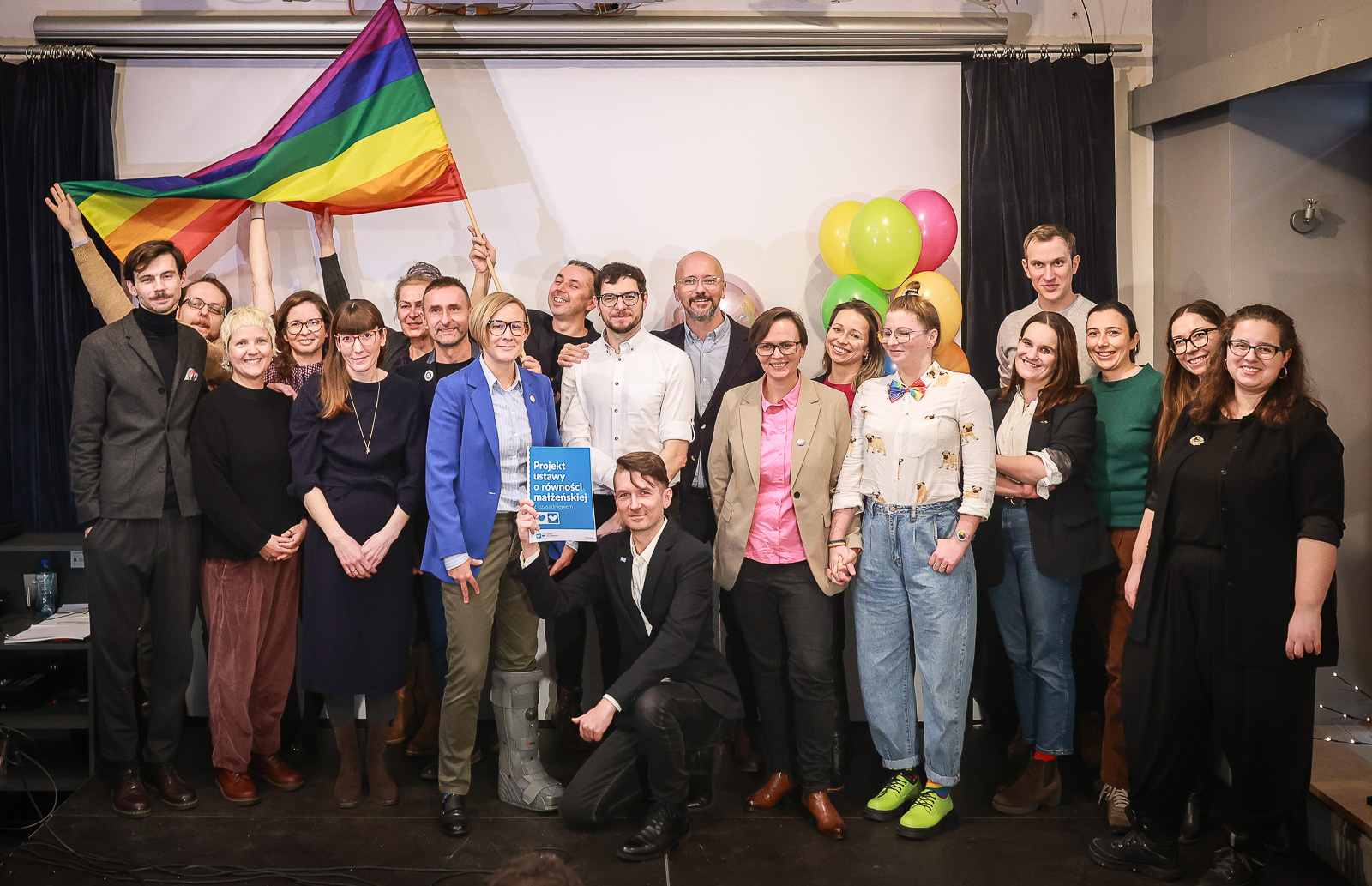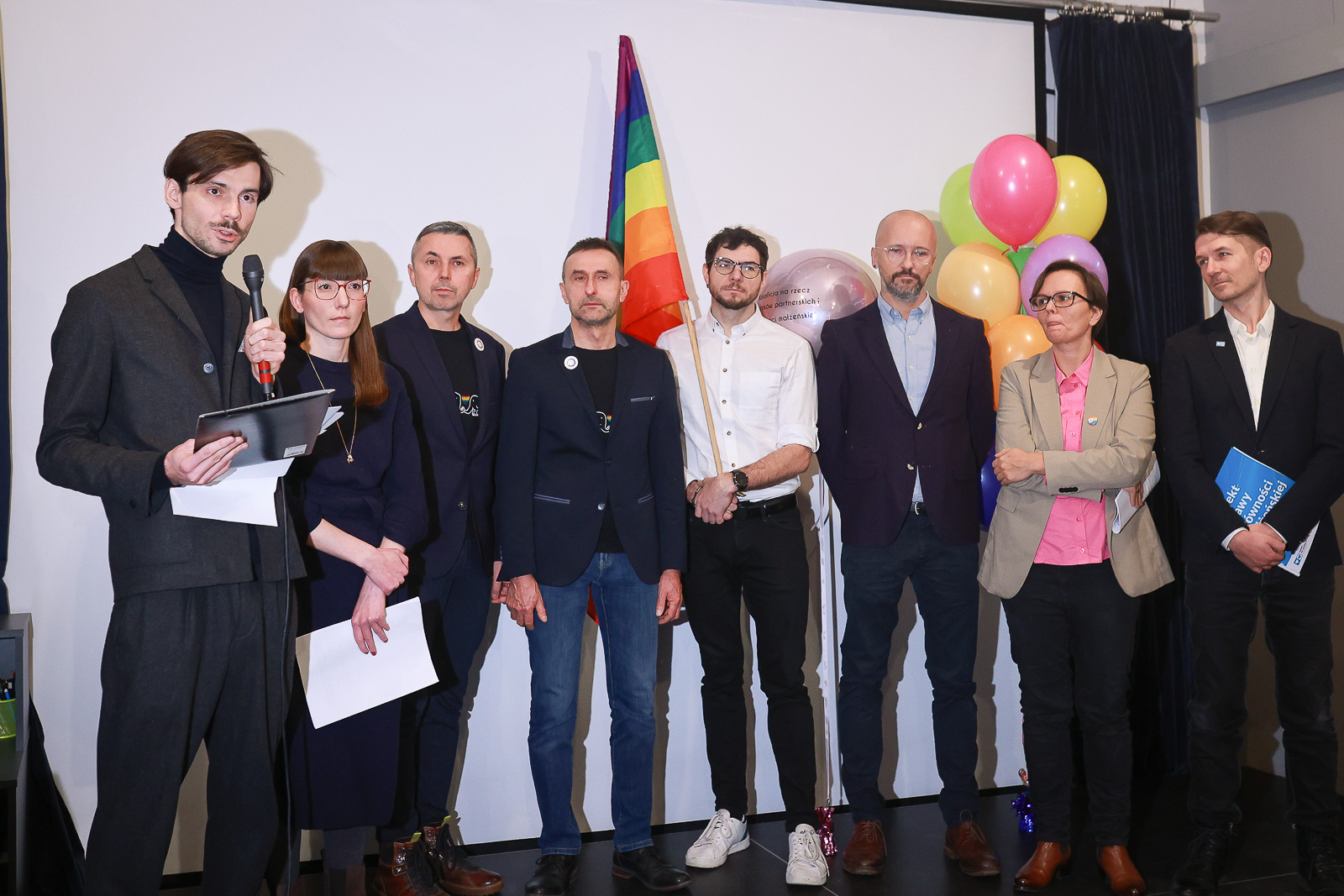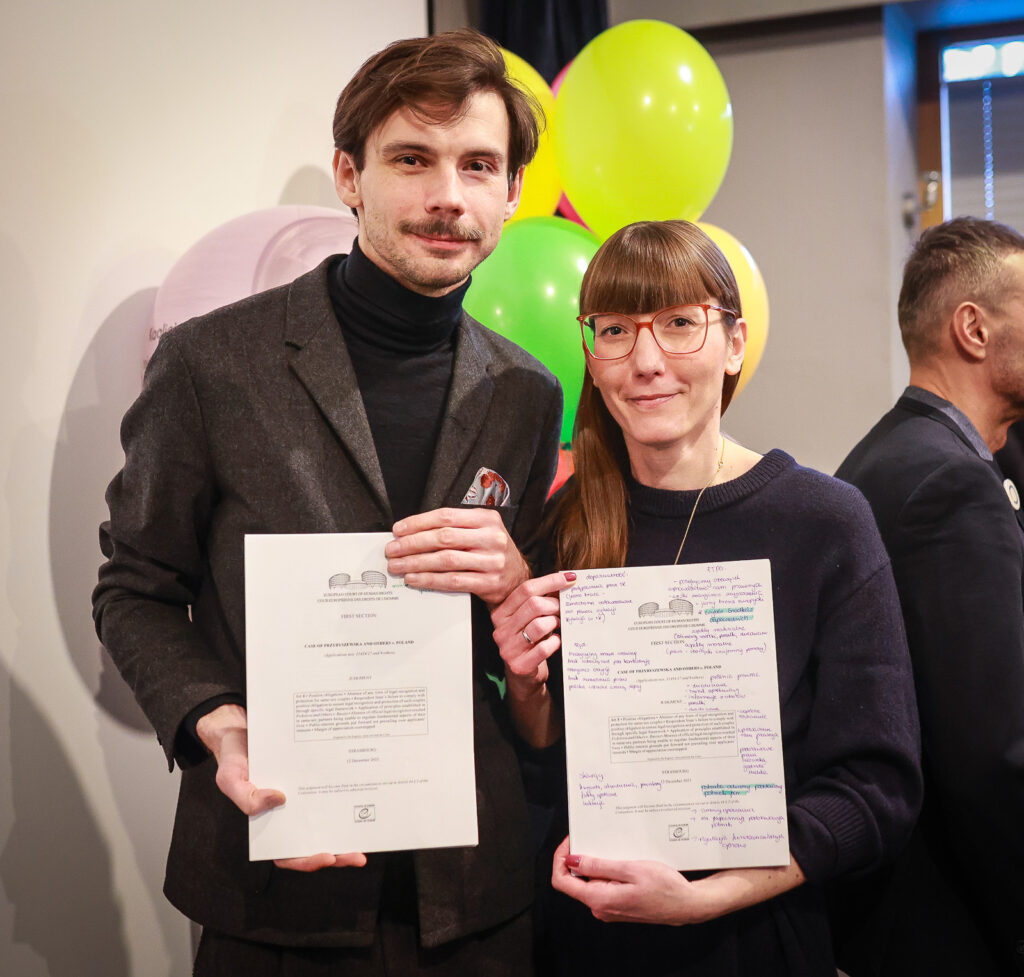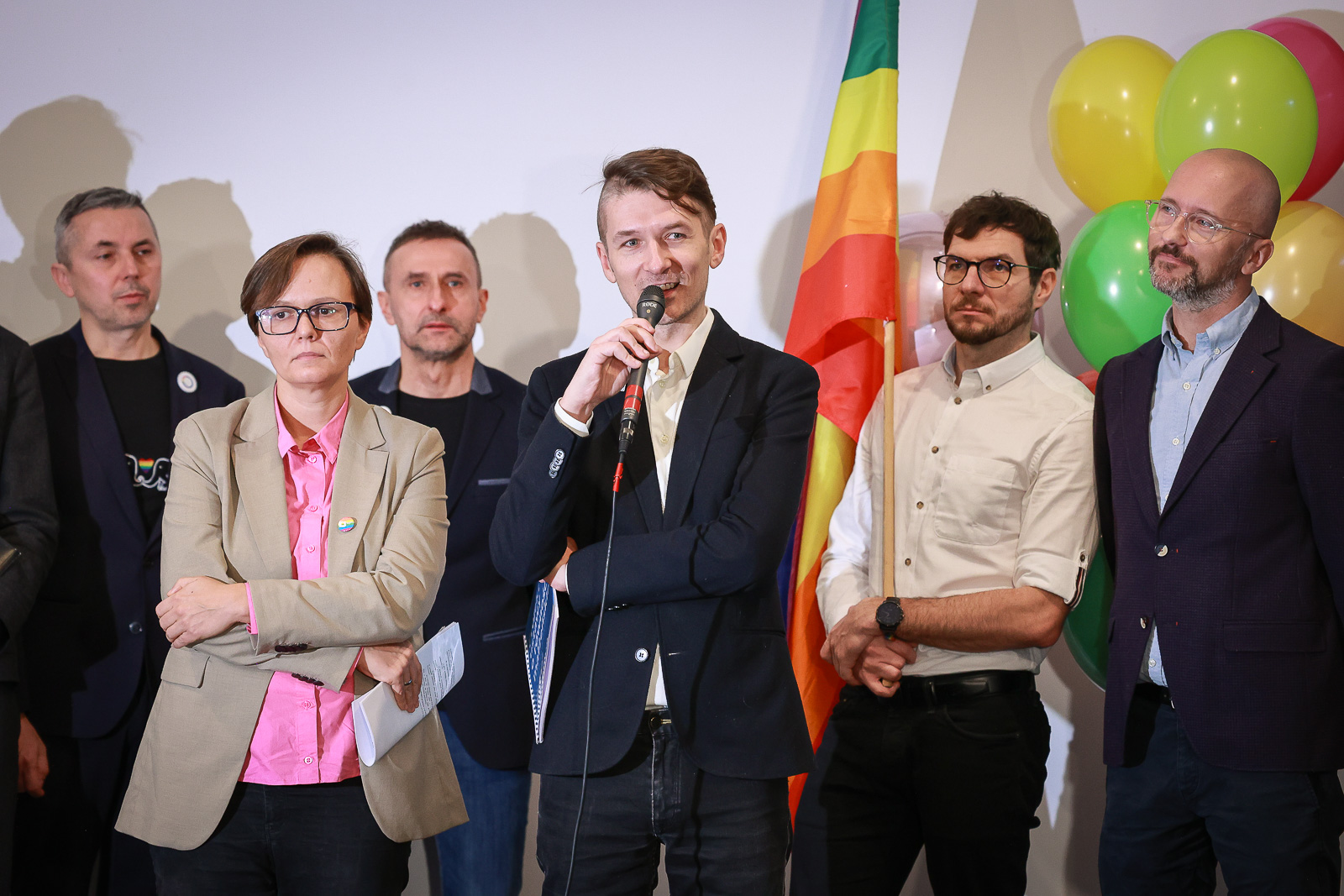The Strasbourg Court has ordered Poland to recognize the rights of same-sex couples. The denial of civil unions and marriage equality is discrimination. “Mr. Prime Minister, let’s meet,” say LGBT+ organizations and lawyers.

The Strasbourg Court has ordered Poland to recognize the rights of same-sex couples. The denial of civil unions and marriage equality is discrimination. “Mr. Prime Minister, let’s meet,” say LGBT+ organizations and lawyers. Today (December 12, 2023) the European Court of Human Rights (ECtHR) ruled in a case against Poland brought by five Polish same-sex couples seeking legal recognition of their relationships. The ruling states that Poland has violated the Convention and has an obligation to introduce legal protection for same-sex couples. The form of this protection shall be appropriate and shall protect same-sex couples effectively.
The verdict comes after eight years of work by the Coalition for Civil Unions and Marriage Equality, founded by the Love Does Not Exclude Association, the Campaign Against Homophobia, pro bono law firms, attorneys, the Polish Society for Anti-Discrimination Law, and the Helsinki Foundation for Human Rights. But most importantly, it marks the end of a court battle by five gay and lesbian couples who are demanding equal treatment from Poland.
“This ruling is proof that the defiance of individuals can change reality. Our Coalition is a testament to the fact that when politicians fail, ordinary people take matters into their own hands and successfully fight for their rights. The tenacious persistence of these five couples has shaken the state. As of today, we start living in a new reality in which the roles have reversed. Same-sex couples no longer have to ask to be recognized in court or in an office. Thanks to the Court’s verdict, it is the state that has to start justifying why it has not yet put proper legal protection in place,” says attorney Paweł Knut, coordinator for the Coalition.

Press conference, photo: Tomek Kaczor
How did the couples react to the verdict?
“After years of right-wing rule and no progress in our case, this news has made us very happy. We became hopeful that we may live to see the moment when the state finally acknowledges our 20-year relationship after all. This is important to us for practical reasons – security in our daily lives – but also for symbolic reasons: so we can finally feel that the state treats us on an equal footing with other citizens. Of course, we hope that the ruling coalition will take the verdict seriously and quickly fulfill the promises they made during the election campaign,” commented Michał and Wojciech, one of the litigant couples.
“Finally! We are very happy about this verdict. We hope that it will set in motion a whole avalanche of good changes in Poland in terms of the rights of all non-heteronormative people, and that finally our state and the new authorities will take us seriously. We have been waiting for this day for a very long time. The years of the Law and Justice (PiS) government were especially harsh – an excruciatingly long time of constant viciousness against us and of spreading hate speech with impunity. We hope that genuinely good changes are coming and that we will soon be able to feel dignified and safe in our homeland. We want to finally formalize our 21-year relationship in the same way as different-sex couples do. There is no justice without equality,” say Krzysztof and Grzegorz, the second of the couples subject to the ECtHR ruling.
What did the Court rule?
The judgment said that by denying same-sex couples legal recognition of their unions, Poland is violating their right to respect for family life. The Court called on Poland to redress this damage by introducing appropriate legislative changes as soon as possible, without specifying what exact form they should take.
“This judgment leaves no doubt: the lack of legal recognition of same-sex couples in Poland contravenes the European Convention on Human Rights and the right to respect for private and family life that it guarantees. The Strasbourg Court’s ruling is unequivocal and stable, as has already been seen in judgments handed down in similar cases involving other European countries. I can only envision a positive outcome: the Polish authorities are obliged to effectively implement this judgment by changing Polish law. Together, we hope that this will happen as soon as possible,” says attorney Małgorzata Mączka-Pacholak, one of the lawyers representing the couples in Strasbourg.

Press conference, photo: Tomek Kaczor
What will the Polish authorities do?
The Court has already ruled in similar cases brought against Italy (in 2015), Russia, Romania, and Bulgaria (this year), and found that the plaintiff couples were right to demand legal safeguards from their countries. Shortly after the ruling, Italy introduced civil unions that grant same-sex couples some of the rights available to married couples. What do NGOs expect from the Polish authorities?
“Public support for marriage equality is growing and approaching 50%. Support for civil unions has been above this threshold for years. A draft bill on marriage equality has also been prepared. Today, the Court made it clear that safeguarding the rights of same-sex couples in Poland is not a matter of discretion, but the duty of politicians. We are ready and willing to work, we are just waiting for a signal to the new government,” says Hubert Sobecki of the Love Does Not Exclude Association.
“After 8 years of humiliation, a campaign of hatred against LGBT+ people by the government and the state apparatus, a face-to-face meeting with the Prime Minister is badly needed, not least so that Polish women and men can see that there is no longer a better and worse class of citizens, only one nation that we, LGBT+ people, are a part of,” says Mirka Makuchowska of the Campaign Against Homophobia.
“That’s why we are jointly calling on Prime Minister Tusk today to meet with LGBT+ organizations to talk about the next steps: changing the law to one that will protect all and any of us,” Makuchowska and Sobecki add.
“It is certainly Poland’s duty now to carry out the judgment by introducing civil unions. I have no doubt that the new government is finally committed to fulfilling its obligations as a member of the Council of Europe,” says Anna Mazurczak of the Polish Society of Antidiscrimination Law.
“We are glad that finally, more than 10 years after the first legal complaint about the lack of legal protection for same-sex unions in Poland was filed with the support of the Helsinki Foundation, the Court has issued a verdict on rainbow families. Now it will be the government’s job to carry out this judgment, change the law and allow same-sex couples to formalize their relationships,” says Jarosław Jagura, a lawyer working with the Helsinki Foundation for Human Rights.
Poland at the tail end of Europe
The European Court of Human Rights rules on cases involving the 46 member states of the Council of Europe, from Iceland to Turkey. There is a divide among them when it comes to the rights of same-sex couples, with countries in Western Europe offering greater legal protection and countries east of the former Iron Curtain ignoring or violating the rights of LGBT+ people.
The divide is even deeper when one looks just at the European Union, where only five countries do not allow same-sex couples to formalize their relationships. Besides Poland, these are Bulgaria, Lithuania, Romania, and Slovakia.
Within the EU, marriage equality has been introduced by Austria, Belgium, Denmark, Estonia, Finland, France, Germany, Ireland, Luxembourg, Malta, the Netherlands, Portugal, Slovenia, Spain, and Sweden. Married same-sex and different-sex couples in those countries have the same rights and obligations. In turn, Czechia, Croatia, Cyprus, Greece, Latvia, Hungary, and Italy have introduced civil unions. Each of these countries offers a different set of rights, but one that is always more limited than marriage.
Attempts to grant rights to same-sex couples have been underway in Poland for more than 20 years. Several widely different draft bills on civil unions and one on marriage equality have been submitted to the Polish parliament, the Sejm, which has either rejected or not proceeded with them at all. In 2022, the Supreme Administrative Court ruled that the Constitution does not prohibit the introduction of civil unions or marriage equality.

Press conference, photo: Tomek Kaczor
Media contact:
- Małgorzata Mączka-Pacholak, attorney, one of the attorneys representing the couples before the ECtHR, + 48 603 345 650
- Hubert Sobecki, Love Does Not Exclude, +48 501 647 563, hsobecki@mnw.org.pl
- Anna Wrzeszczyńska, Campaign Against Homophobia, 505 023 311, awrzeszczynska@kph.org.pl
For more information, visit www.dostrasburga.pl
The Coalition for Civil Unions and Marriage Equality was established in November 2015. It is made up of five gay and lesbian couples and the NGOs supporting them – Love Does Not Exclude, the Campaign Against Homophobia, the Polish Society for Anti-Discrimination Law, and the Helsinki Foundation for Human Rights – legal counsel Marcin Górski and attorneys Paweł Knut and Krystian Legierski, as well as attorneys Małgorzata Mączka-Pacholak, Paweł Osik, and Mikołaj Pietrzak of the law firm Pietrzak, Sidor and Partners, as part of the Polish Society for Anti-Discrimination Law’s “Pro Bono for Equality” program. The Coalition’s goal has been to lead to the European Court of Human Rights’ historic ruling that will oblige Poland to adopt legislation allowing same-sex couples to enter into civil partnerships or marriages.
Q&A
- What does the judgment say?
The ECtHR ruled that there was a violation of the right to respect for private and family life and of the prohibition of discrimination against same-sex couples on the grounds that they cannot formalize their relationship in any way.
- Is this judgment binding on Poland?
The verdict is binding on Poland and the Polish authorities are obliged to implement it.
- Can the Polish authorities ignore this verdict? What are the consequences for doing so?
The Polish authorities can ignore the ECtHR judgment, as shown by the example of the judgements on rule of law. They may even use the Constitutional Court to challenge the binding force of the ECtHR judgment. However, the Polish authorities should not disregard the ECtHR ruling, because the obligation to comply with it stems from Article 46 of the European Convention on Human Rights. If the Polish authorities do not comply with the judgment, we will face supervision/enhanced supervision by the Committee of Ministers of the Council of Europe and admonitions in the international arena, which will weaken Poland’s image. Unlike the EU system, the Council of Europe bodies cannot impose financial penalties on States Parties to the Convention for failure to implement a judgment.
- Will someone monitor the implementation of this judgment?
Yes, a special body of the Council of Europe, the Committee of Ministers of the Council of Europe (CME). If there are delays with the implementation of the judgment, the CME will call on the Polish authorities (in practice, on the Ministry of Foreign Affairs) to provide information and an explanation as to what the plan is for the implementation of the judgment.
- Can this judgment be appealed?
Yes, a party that is dissatisfied with a judgment has 3 months from its issuance to file a referral to the Grand Chamber of the ECtHR. In practice, the parties (the Polish government) very rarely use this route, and even more rarely do so successfully. To submit a request for a case to be heard by the Grand Chamber, it must be demonstrated that serious and exigent conditions have been met, such as a serious issue with respect to the interpretation or application of the Convention or its Protocols or a significant issue of general importance. With regard to this particular victory, since the ECtHR’s case law is so stable, the Polish government’s application is unlikely to succeed.
- Does the implementation of this judgment require an amendment to the Polish Constitution?
In our opinion, as far as single-sex unions are concerned, the implementation of the ECtHR judgment does not require an amendment to the Polish Constitution. Our position is that Article 18 of the Constitution provides special legal protection for marriages as a union of a man and a woman, which means that 1) the Constitution does not define what marriage is (it only provides special protection for different-sex marriage AS a union of a man and a woman, not marriage, THAT IS, a union of a man and a woman) and 2) it is possible to grant other (e.g., statutory) legal protection to civil unions, including those of same-sex couples, though less comprehensive than for marriages.
- Does this ruling mean that civil unions should be introduced for heterosexual couples?
The ECtHR’s judgment concerns complaints filed by people in same-sex unions as well as objections to the inability to formalize and legally protect such relationships. Of course, there is no obstacle for future legal changes to also amend the legal situation of people in different-sex unions.
Tags
Also check
Last added
-
23.12.2025
Thank you for another year we shared together!
-
19.12.2025
The “Pride & Parent – Rainbow Parenthood in Poland” e-book is now available!
-
01.12.2025
Another edition of Pride & Parent workshops is behind us, online workshops coming soon!
-
25.11.2025
Groundbreaking CJEU ruling: Failure to transcribe a foreign same-sex marriage certificate is incompatible with EU law
-
25.11.2025
The final day to apply for the “Building Equality Together” grant programme!
KPH Newsletter
Subscribe to our newsletter and we will make sure you receive information about the actions undertaken by our organization.

 Profile on Facebook. Page opens in new window.
Profile on Facebook. Page opens in new window. Profile on Twitter. Page opens in new window.
Profile on Twitter. Page opens in new window. Profile on Linkedin. Page opens in new window.
Profile on Linkedin. Page opens in new window. Profile on Youtube. Page opens in new window.
Profile on Youtube. Page opens in new window. Profile on Instagram. Page opens in new window.
Profile on Instagram. Page opens in new window. Profile on TikTok. Page opens in new window.
Profile on TikTok. Page opens in new window.